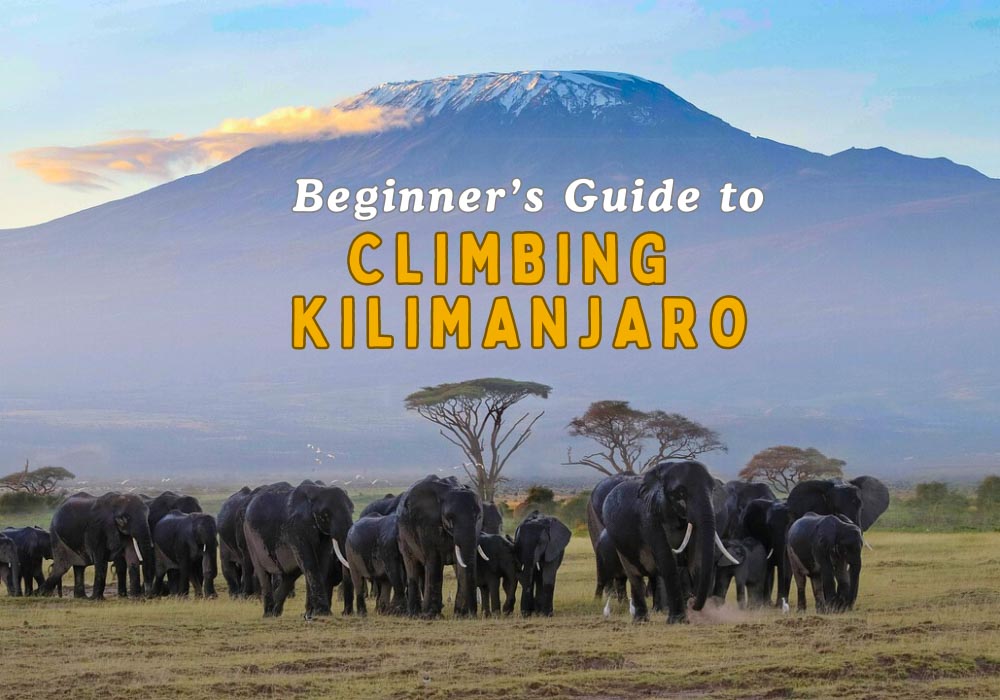
Welcome to our climbing Kilimanjaro guide, your ultimate beginner’s resource for conquering Africa’s highest peak, located in the country of Tanzania.
This darn good climbing Kilimanjaro guide is designed specifically for beginners, offering all the crucial information you need to plan and execute a successful climb. We’ll cover just about everything from the best time to climb and the different routes available, to tips for preparation and acclimatization.
Mount Kilimanjaro, standing at 19,341 feet, is not just the tallest mountain in Africa but also one of the most accessible high summits in the world, making it a popular choice for beginner climbers. Sounds pretty cool, yeah?!
In this climbing Kilimanjaro guide, we’ll break down:
- where Mount Kilimanjaro is located and how to get there,
- how long to climb Kilimanjaro, including the hike time and distance
- information about Mount Kilimanjaro’s volcanic history
- climbing Kilimanjaro routes
- Mount Kilimanjaro weather
- is Kilimanjaro hard to climb?
- climbing Kilimanjaro tours
- Mount Kilimanjaro hike cost
- is climbing Kilimanjaro worth it?
Be sure to bookmark this post and refer back to it throughout your planning process! This guide will be invaluable as you prepare for this life-changing adventure.
Ready then? Let’s dive into our climbing Kilimanjaro guide and get you on your unforgettable journey to the Roof of Africa!
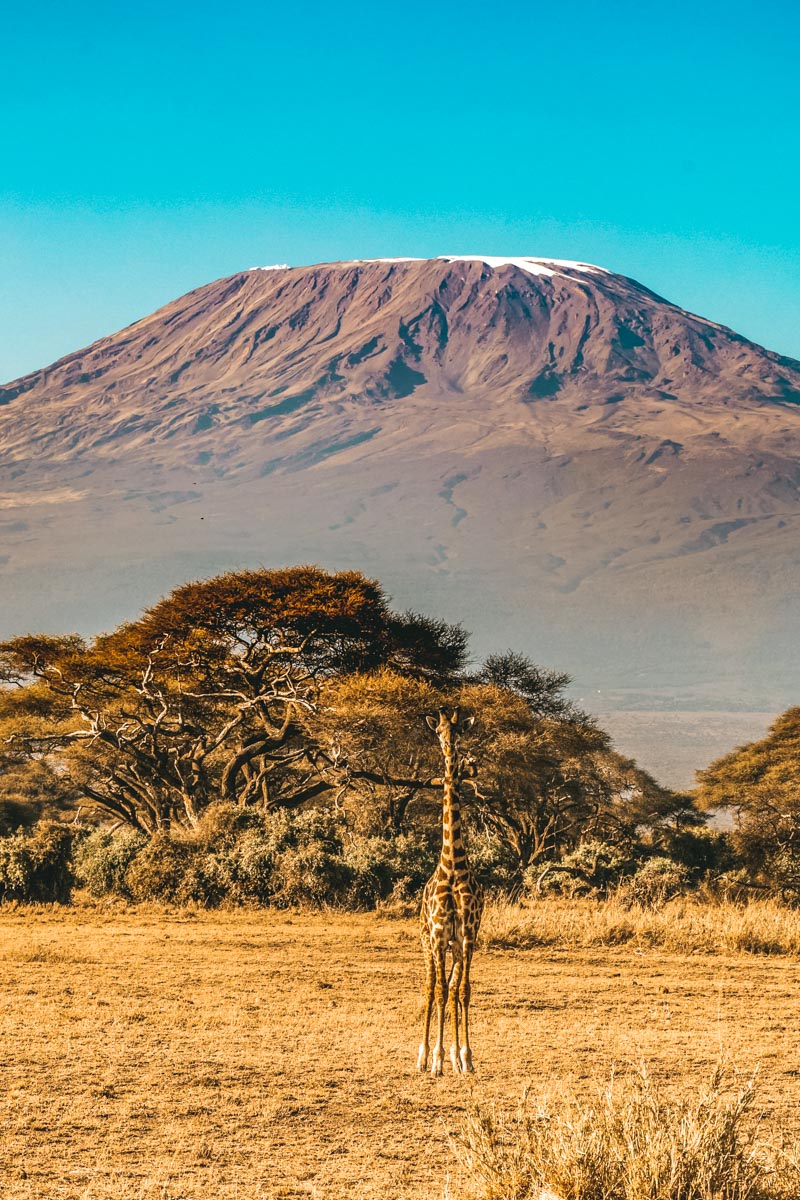
Contents
- Where Mount Kilimanjaro is Located
- How Mount Kilimanjaro Was Formed
- How Long to Climb Kilimanjaro?
- Climbing Kilimanjaro Routes
- Mount Kilimanjaro Weather
- Is Kilimanjaro Hard to Climb?
- Climbing Kilimanjaro Tours
- Is Climbing Kilimanjaro Worth It?
- Like this post?
- You Might Also Appreciate…
- Have you ever taken the climbing Kilimanjaro Machame Route?
Where Mount Kilimanjaro is Located
Towering over northern Tanzania, Mount Kilimanjaro stands as Africa’s highest peak, standing proudly at 19,341 feet above sea level.
Its peak often shrouded in mist and crowned with snow, Mount Kilimanjaro is located near the border with Kenya, within the Kilimanjaro National Park. Looks pretty epic!
How to Get to Kilimanjaro
The most popular way to get to Mount Kilimanjaro is to fly in to Kilimanjaro International Airport (KRO), which is conveniently located about 50 km from the mountain.
By Plane
Many travelers opt to fly into this airport, which is serviced by several major airlines from Europe, the Middle East, and other parts of Africa.
Upon arrival, the town of Moshi serves as a popular base for climbers, offering a range of accommodations and services to prepare for the ascent.
Alternatively, Arusha, a larger city about 90 kilometers from Kilimanjaro, provides additional options for lodging and amenities.
Local tour operators often include transportation from these towns to the mountain’s various trailheads, ensuring a seamless journey from start to finish.
By Land
Alternatively, Kilimanjaro is also easily reached by land.
There are many daily buses from various locations in Kenya and Tanzania that take you to Arusha and Moshi.
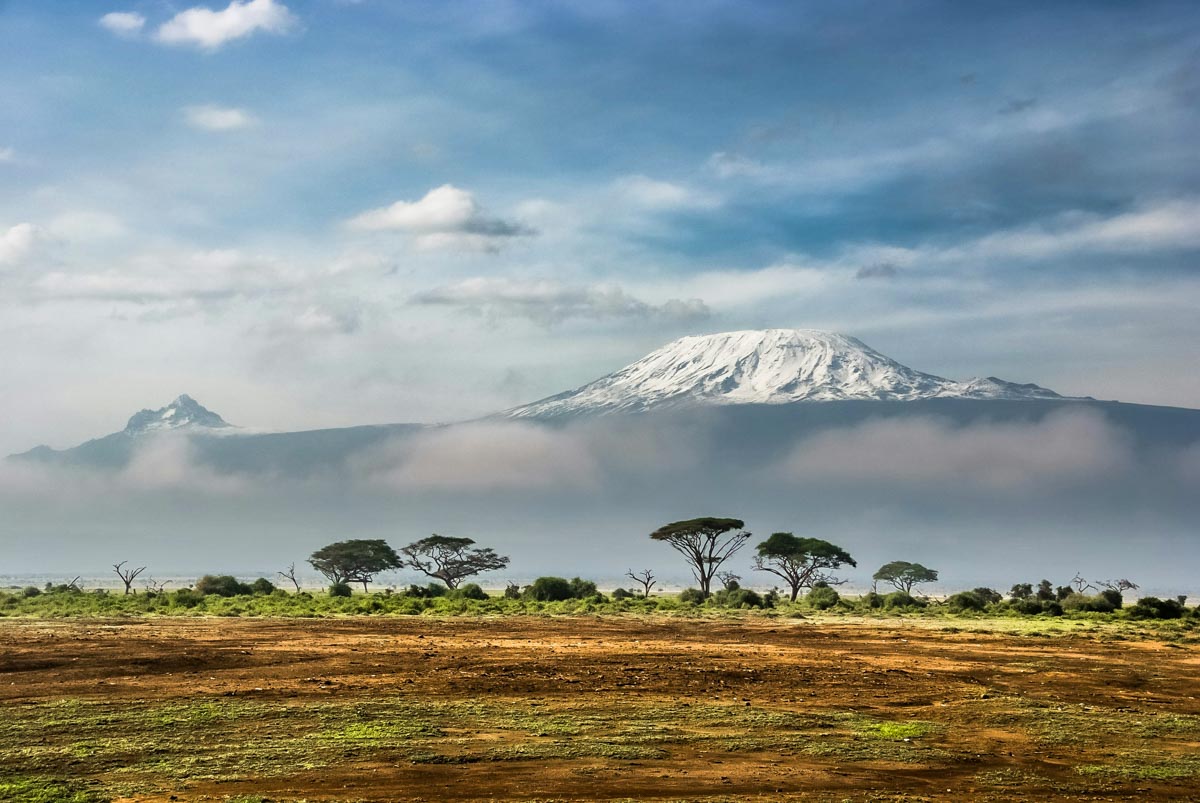
How Mount Kilimanjaro Was Formed
Mount Kilimanjaro was formed around three million years ago due to volcanic eruptions. The most recent major Mount Kilimanjaro eruption was around 360,000 years ago.
These Mount Kilimanjaro eruptions created the mountain’s current structure, contributing to its diverse ecosystems and towering height of 19,341 feet.
Today, Kilimanjaro stands as a dormant volcano with occasional gas emissions from its crater, showcasing its dynamic geological history.
How Long to Climb Kilimanjaro?
How long it’ll take to climb Kilimanjaro depends on the chosen route and the individual climber’s pace. We’ll get deeper into the top climbing Kilimanjaro routes later on in our climbing Kilimanjaro guide.
Typically, the Mount Kilimanjaro hike time ranges from five to nine days.
Shorter itineraries, such as the Marangu or Rongai routes, can be completed in five to six days, but these rapid ascents often come with a higher risk of altitude sickness due to less time for acclimatization.
The longer routes, like the Machame, Lemosho, and Northern Circuit, usually take seven to nine days, allowing more time for acclimatization and increasing the chances of a successful summit.
The Mount Kilimanjaro hike distance also varies by route, with the shortest being the Marangu route at approximately 64 kilometers (40 miles) round trip, and the longest being the Northern Circuit at about 98 kilometers (61 miles).
Can You Climb Kilimanjaro in a Day?
Some of you are wondering: can you climb Kilimanjaro in a day?
The simple answer is no.
Climbing Mount Kilimanjaro in a single day is basically impossible due to the mountain’s sheer height and the significant risks associated with rapid ascent, particularly altitude sickness.
Kilimanjaro’s summit stands at 19,341 feet (5,895 meters) above sea level, and the trek involves traversing diverse terrains and significant elevation gains that require proper acclimatization.
However, for those who want to experience the beauty of Mount Kilimanjaro without committing to a full summit attempt, Kilimanjaro day hikes offer a fantastic alternative. These shorter excursions allow you to explore the lower slopes of Kilimanjaro and enjoy its diverse ecosystems and stunning landscapes within a single day.
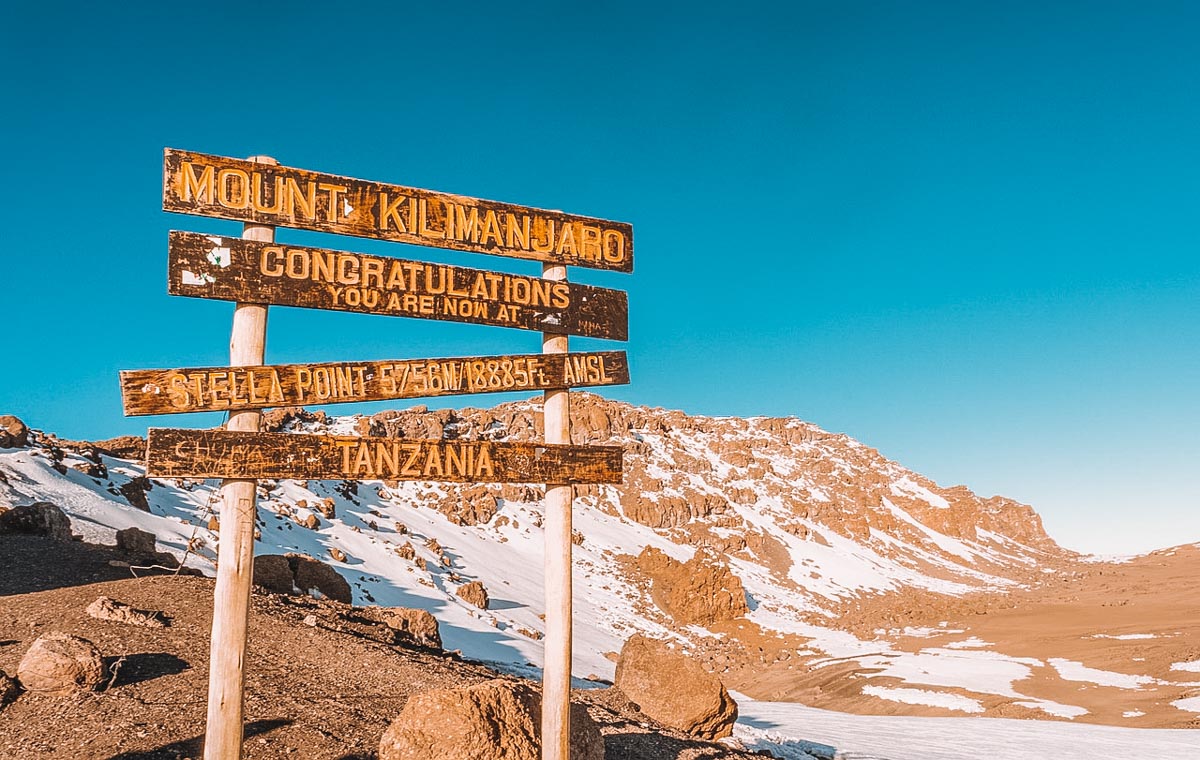
Climbing Kilimanjaro Routes
Kilimanjaro is one gorgeous blend of varied ecosystems. As you ascend, you’ll traverse lush rainforests teeming with unique flora and fauna, cross the stark and surreal alpine desert, and finally reach the icy summit. Utterly mind-blowing.
Each zone presents its own challenges and beauty, from the colobus monkeys swinging in the trees to the striking views of the savannah below.
The three most popular climbing Kilimanjaro routes are Marangu, Machame, and Lemosho. Here is some important information to know about each route.
Marangu
The Marangu Route, often referred to as the “Coca-Cola Route,” is a renowned climbing Kilimanjaro route for its relatively straightforward path and hut accommodations.
It is the only one of the climbing Mt Kilimanjaro routes offering dormitory-style lodging, which can be a comforting option for those new to high-altitude trekking.
This route typically takes five to six days, a Mount Kilimanjaro route distance of about 64 kilometers (40 miles) round trip.
Machame
The climbing Kilimanjaro Machame Route, known as the “Whiskey Route,” is favored for its scenic beauty and challenging terrain.
Machame treks through diverse landscapes, from lush rainforests to rugged alpine deserts, making it a visually rewarding experience.
This route requires six to seven days to complete, with a total distance of approximately 62 kilometers (38.5 miles). climbing Kilimanjaro on this route is a steeper and more demanding climb, but the extra effort is well worth it for the panoramic views and varied scenery.
Lemosho
The Lemosho Route is celebrated for its stunning vistas and higher success rates due to better acclimatization opportunities.
This route takes seven to eight days, traversing around 70 kilometers (43.5 miles). Starting on the western side of the mountain, Lemosho offers a more gradual ascent, passing through remote wilderness areas before joining the Machame Route near the Lava Tower.
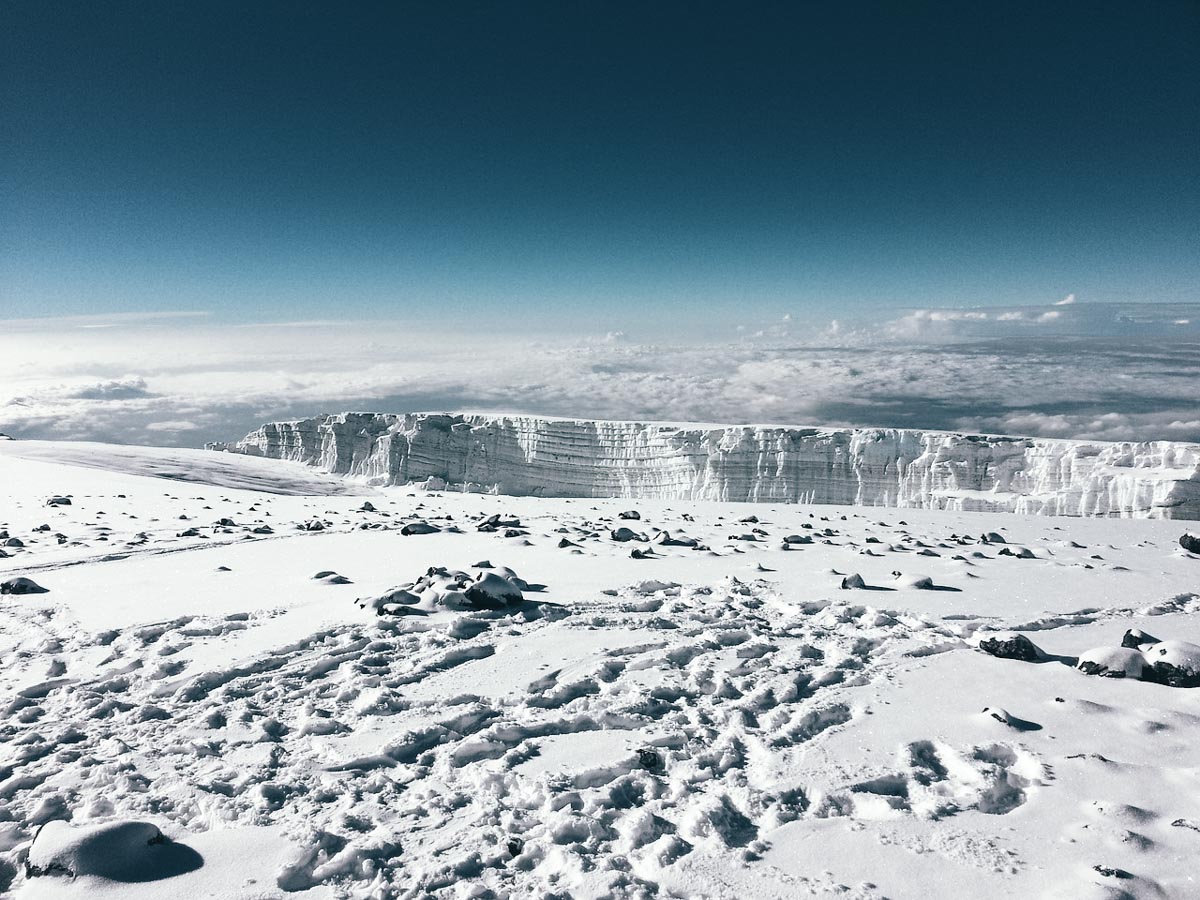
Mount Kilimanjaro Weather
Let’s get into the Mount Kilimanjaro weather, as it’s pretty freaking important for planning a successful climb. After all, conditions can vary significantly depending on the time of year and altitude.
Even though Kilimanjaro is located only 200 miles from the equator, don’t expect tropical weather while climbing the mountain.
Mountains of Kilimanjaro’s size and elevation create their own weather, and climbers need to be prepared for drastically different weather conditions depending on where they are on the mountain.
Here’s a detailed breakdown of Mount Kilimanjaro weather:
Rainforest Zone (Up to 3,000 meters/9,842 feet)
- Weather: Warm and humid conditions, with frequent rainfall, particularly during wet seasons (April to May, November to early December)
- Temperatures: Typically range from 20°C to 30°C (68°F to 86°F)
Heath and Moorland Zone (3,000 to 4,200 meters/9,842 to 13,780 feet)
- Weather: Cooler and less humid than the rainforest. Daytime can be warm and sunny, but nights are much colder
- Temperatures: Daytime temperatures range from 5°C to 15°C (41°F to 59°F), while nighttime temperatures can drop below freezing
Alpine Desert Zone (4,200 to 5,000 meters/13,780 to 16,404 feet)
- Weather: Harsh, dry conditions with significant temperature fluctuations between day and night
- Temperatures: Daytime temperatures can range from -4°C to 10°C (25°F to 50°F), while nighttime temperatures often fall well below freezing
Arctic Zone (Above 5,000 meters/16,404 feet)
- Weather: Extremely cold and windy, with a high likelihood of snow and ice. The air is thin, and conditions are harsh.
- Temperatures: Typically range from -7°C to -20°C (19°F to -4°F), with even lower wind chill factors
Due to the widely ranging weather and temperature conditions encountered on Mount Kilimanjaro, it’s crucial for climbers to bring clothing with proper layers and protection from the elements. Next on our climbing Kilimanjaro guide, we’ll get into the best time of year to visit.
Climbing Kilimanjaro: Best Time of Year
The best time of year for climbing Kilimanjaro is during the dry seasons, which are late December to early March and late June to October.
These months are considered the Kilimanjaro climbing season, offering the best weather conditions with clear skies, minimal rainfall, and relatively stable temperatures. During these times, climbers can expect less slippery trails and more predictable weather patterns, making the trek safer and more enjoyable.
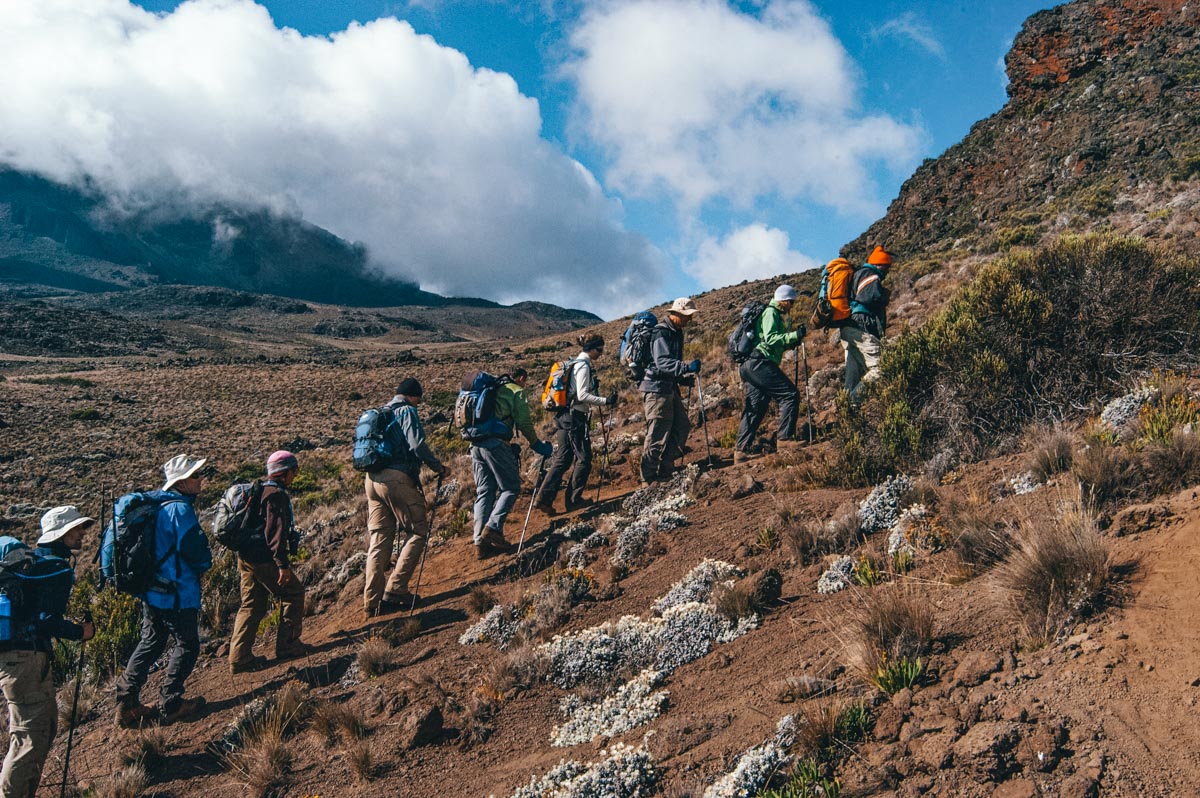
Is Kilimanjaro Hard to Climb?
Many people who aspire to conquer Kilimanjaro wonder, “Is Kilimanjaro hard to climb?”
Let’s dive in.
Climbing Mt Kilimanjaro Difficulty
The climbing Kilimanjaro difficulty level is significant due to the high altitude, which can cause altitude sickness with symptoms like headaches and nausea.
The climbing Mt Kilimanjaro difficulty level also entails long days of hiking on steep and uneven terrain, requiring good physical fitness. Additionally, the varied and unpredictable weather conditions, ranging from humid rainforests to freezing, windy summits, add to the challenge.
So, is climbing Kilimanjaro hard?
Yes, it is a demanding trek that requires thorough preparation and determination.
This doesn’t mean that climbing Kilimanjaro is impossible. Rather, the best way to deal with the difficulty of climbing Mount Kilimanjaro is training and preparation.
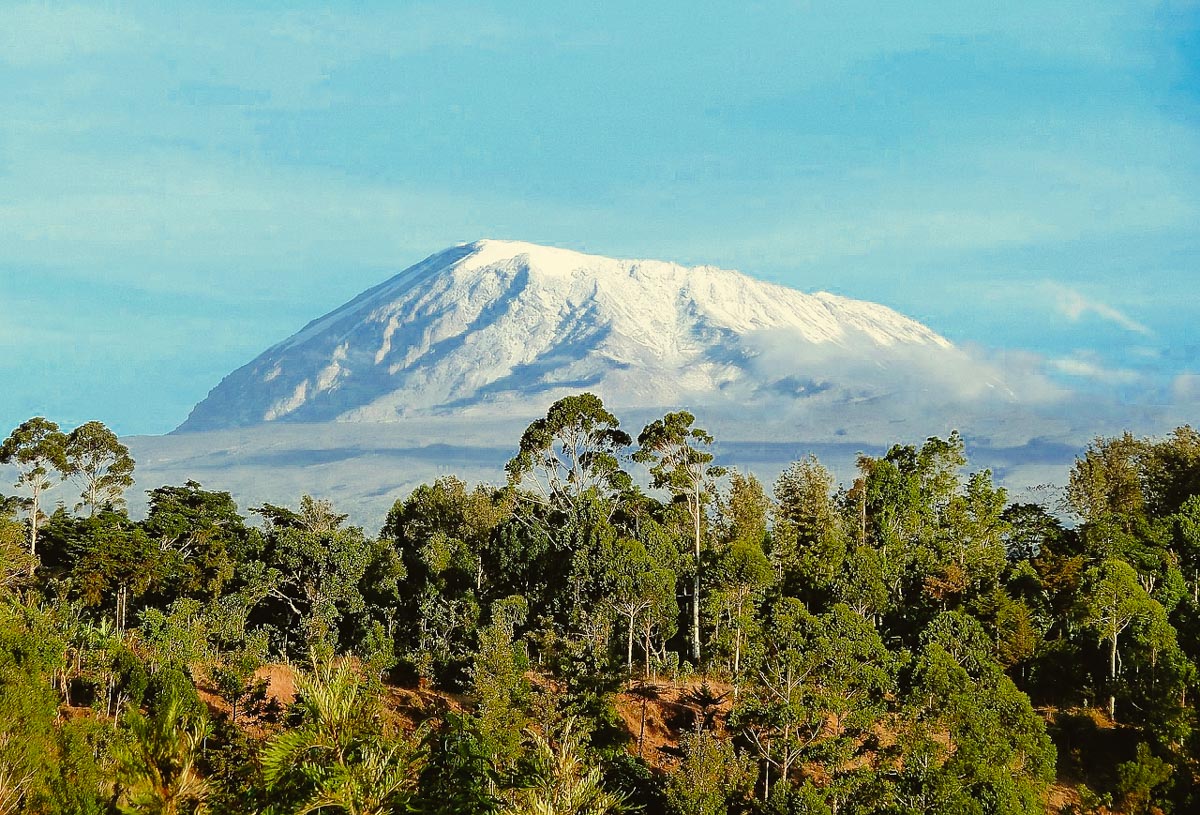
Climbing Kilimanjaro Preparation
A successful ascent requires proper climbing Kilimanjaro preparation—involving both physical and mental readiness. It’s very, very important!
Climbing Kilimanjaro training should include regular cardiovascular and strength exercises, such as hiking, running, and weight training, to build endurance and stamina.
Additionally, practicing hikes on uneven terrain and at increasing altitudes can help your body acclimate to the conditions you’ll face.
Is Climbing Kilimanjaro Dangerous?
I know so many of you are wondering, Is climbing Kilimanjaro dangerous?
While climbing Kilimanjaro is a challenging endeavor, it is generally considered safe with proper preparation and guidance from experienced guides.
The climbing Kilimanjaro death rate is low compared to other high-altitude climbs (estimated at 1-2 per 1000 climbers), thanks to well-established routes, trained guides, and accessible medical assistance.
However, altitude sickness remains a risk, and climbers must be aware of the symptoms and take necessary precautions to ensure a safe and enjoyable trek.
This leads us to our next section — the importance of Mount Kilimanjaro guides!
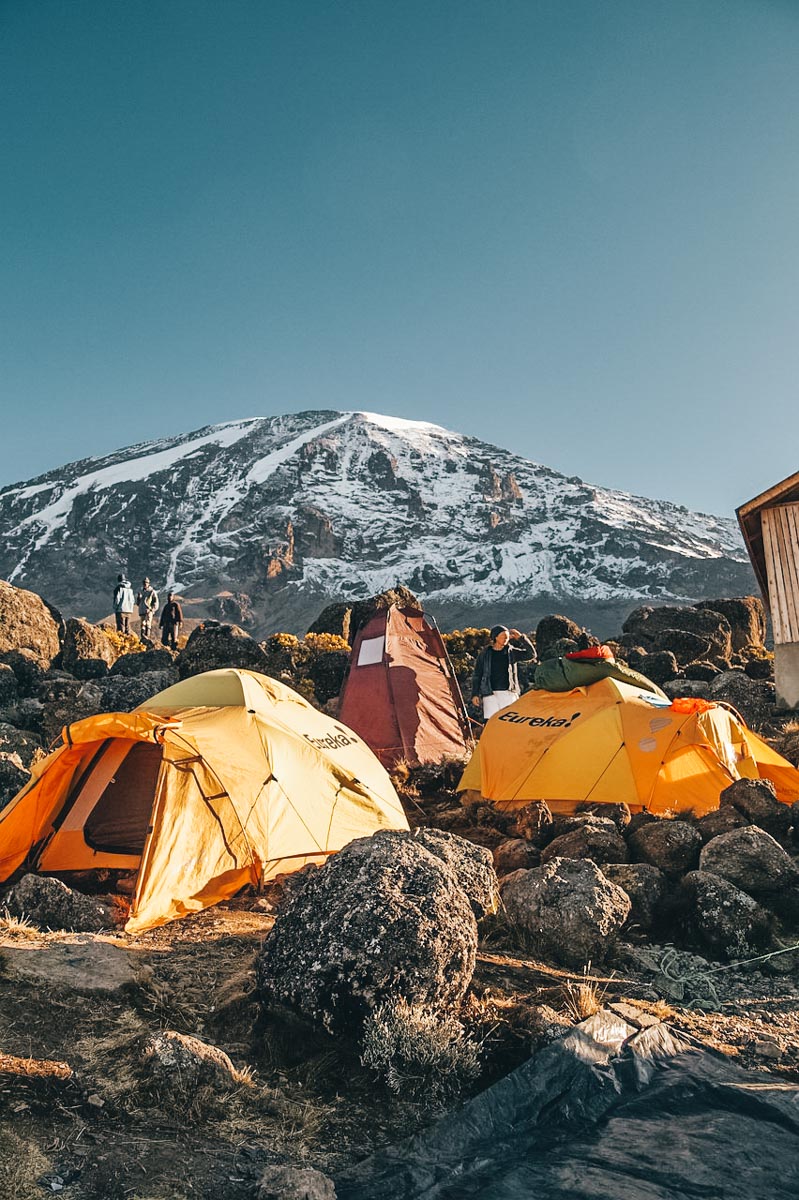
Climbing Kilimanjaro Tours
Choosing a reputable company for climbing Kilimanjaro tours is definitely important for a safe (and successful) ascent.
Having darn good Mount Kilimanjaro guides play a vital role in providing expert knowledge, ensuring safety, and offering support throughout the journey. Not to mention helping climbers acclimatize effectively, manage emergencies, and navigate the varied terrain and weather conditions.
A reliable Kilimanjaro tour company will also prioritize safety measures (of course, super duper important), such as proper equipment, trained staff, and emergency evacuation plans, enhancing the overall experience and increasing the chances of reaching the summit safely.
Altezza Travel: A Top Climbing Kilimanjaro Company
Having good or bad Mount Kilimanjaro guides can definitely make or break your trip.
That’s why the importance of choosing a quality climbing Kilimanjaro guide can’t be stressed enough—personally, we love Altezza Travel for conquering Africa’s highest peak.
Why choose Altezza for your climbing Kilimanjaro guide?
Altezza Travel is the #1 rated climbing Kilimanjaro guide company on Tripadvisor—in fact, they specialize in Kilimanjaro tours, with group tours departing every 2-3 days.
Mount Kilimanjaro Hike Cost
Climbing Kilimanjaro typically costs between $2000 and $2300 per person.
This price range includes a comprehensive package covering essential services such as:
- experienced climbing Kilimanjaro guide
- park fees
- camping equipment (tents and sleeping pads)
- meals prepared by mountain chefs
- porter services
- transportation to and from the Kilimanjaro trailhead in Moshi or Arusha
Additional costs may apply for gear rental, gratuities, and personal expenses.
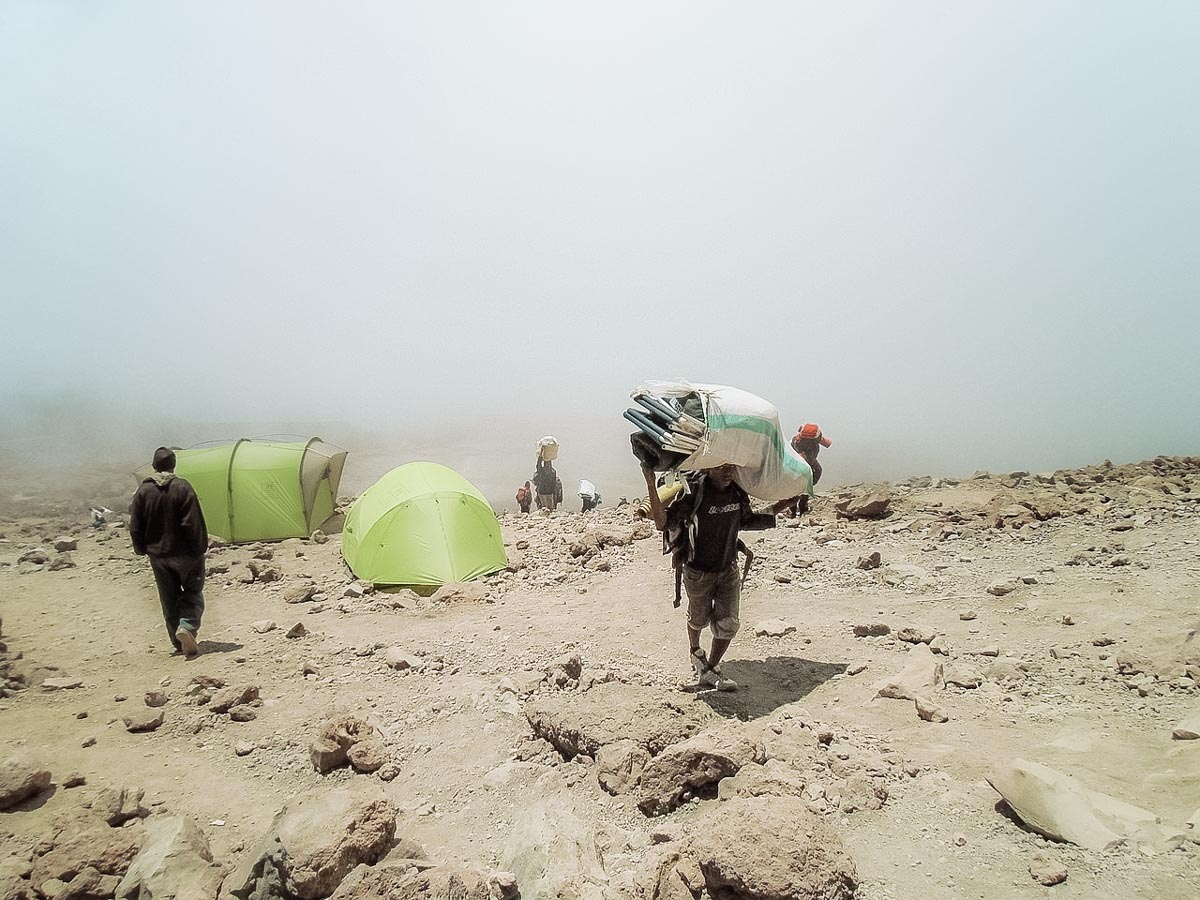
Is Climbing Kilimanjaro Worth It?
Deciding whether climbing Kilimanjaro is worth it is a resounding YES.
Summiting Africa’s highest peak is a once-in-a-lifetime achievement, offering the dopest panoramic views and, yes, the satisfaction of conquering one of the world’s Seven Summits. Pretty badass, if I may say so myself!
The trek also provides one heck of a unique opportunity to experience diverse ecosystems, from lush rainforests to alpine deserts, and to engage with local cultures along the way.
Hands down, this once-in-a-lifetime opportunity to climb one of the world’s most famous mountains far exceeds the time, money, and energy that needs to be invested in climbing Kilimanjaro. We hope our climbing Kilimanjaro guide has helped you get on your way to planning this epic journey!
Climbing Mount Kilimanjaro is an INCREDIBLE adventure, and we’re beyond excited to have helped you with our climbing Kilimanjaro guide.
Feel free to share your experiences climbing Kilimanjaro with us, and let us know which of the climbing Kilimanjaro tours you end up using. No matter what, climbing Kilimanjaro is sure to be an unforgettable experience!
Like this post?
Share it on Pinterest by hovering over one of the pictures below and clicking the red “Pin It” button!
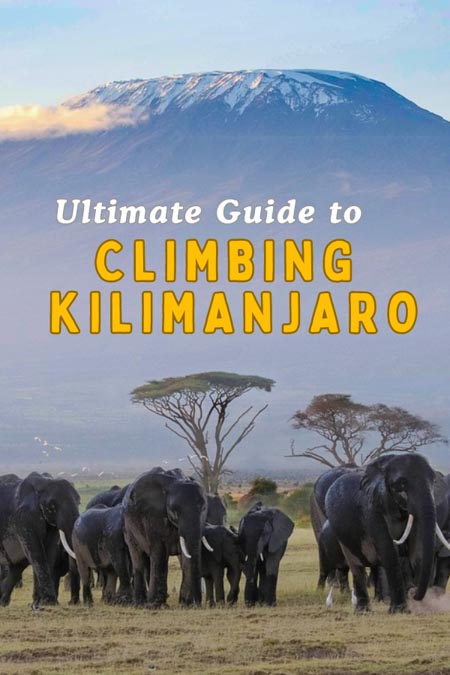 |
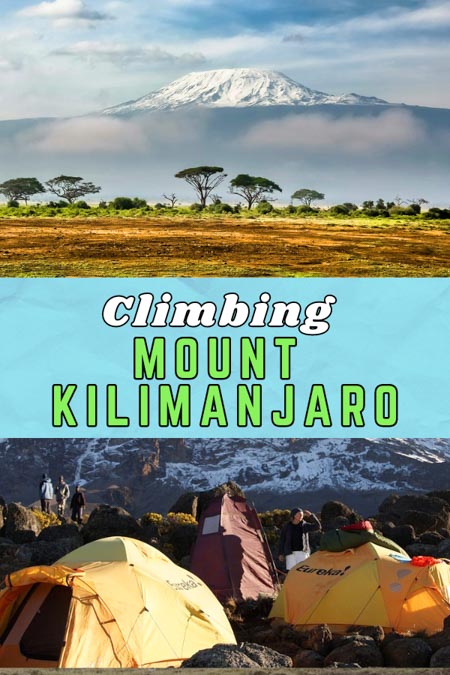 |
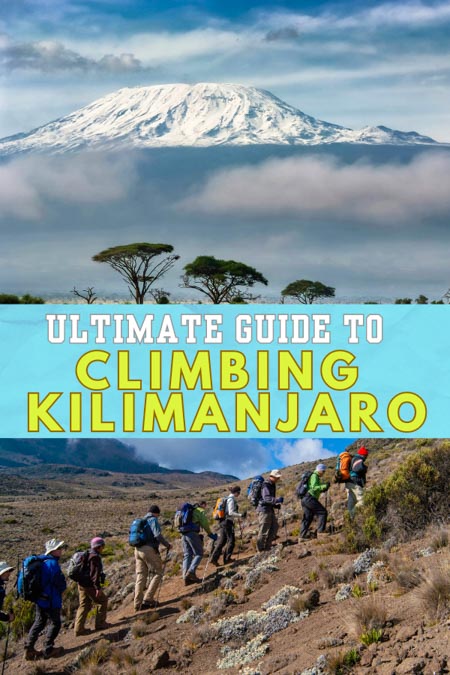 |
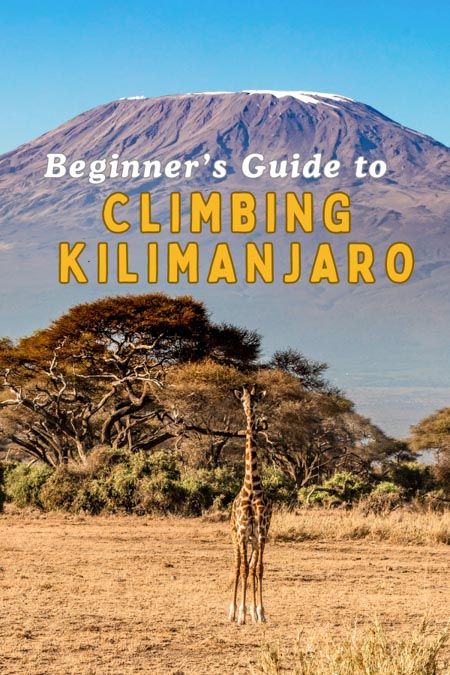 |
You Might Also Appreciate…
More Travel Gear Posts
- Best Budget Travel Cameras to Improve Your Travel Photography
- Travel Drone Tips: Flying a Drone in Cold Weather
- Traveling with a Drone: 8 ESSENTIAL Tips to Avoid Insanity
- Best Travel Drone Bag: Backpacking with a DJI Phantom
- An Essential Carry-On Packing List (+ the Things You CAN’T Take on a Plane)
- Travel in Style: The Best Travel Day Bag (& What to Pack in It)
- Anatomie: The Best Travel Outfits for Long Flights and an On-the-Go Lifestyle
- Survivor Filter Pro Review: How to Purify Water Anywhere in the World
- Protecting Our Smartphones While Traveling with ZAGG
- Cute, Comfy Women’s Shoes for Travel
- Stylish Men’s Travel Wear from Norway
- Shockproof Laptop Case for Travel
Travel Tips
- TSA Rules You Need to Know: A Guide to TSA Carry-On Restrictions
- Travel Hack: Do a Cheap Flight Search Like a Pro
- What I’ve Learned from Traveling to 25 Countries
- Essential Winter Travel Packing List (For Subfreezing Temperatures!)
- 150 Best Travel Photography Hashtags
More Travel Posts
- Coolest Things to Do in Harbin, China (Beyond the Harbin Ice Festival!)
- What to Do in Insadong, South Korea
- Best Family-Friendly Restaurants in Dubai
- Paris Hidden Gems
- Where to Go in Croatia for Couples
- Essential Mexico City Travel Tips
- Yoga Retreat in Rishikesh, India
- Is Chiang Mai Worth Visiting?
- What to Do in Insadong, South Korea: A Seoul Travel Guide
- A Guide to Saint Sophia Cathedral in Harbin, China
- Sagye Beach, South Korea: Best Beach in Jeju Island for a Mt. Sanbangsan View
- Mind-Blowing New Year’s Eve Sri Lanka Party in Mirissa Beach
- The Zesty Truth of Jeju Tangerine Picking: Jeju Island, South Korea
- Daedunsan Mountain & the Cloud Bridge: A South Korea Fall Colors Guide
Have you ever taken the climbing Kilimanjaro Machame Route?
Share in a comment below!
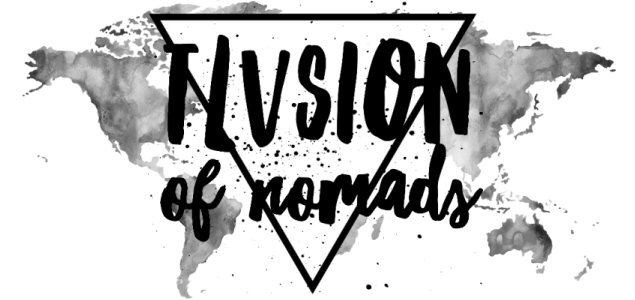
No Comments